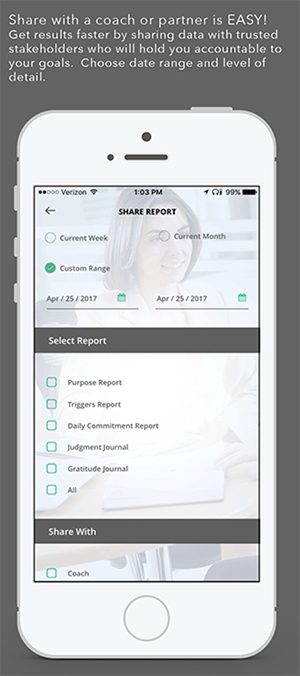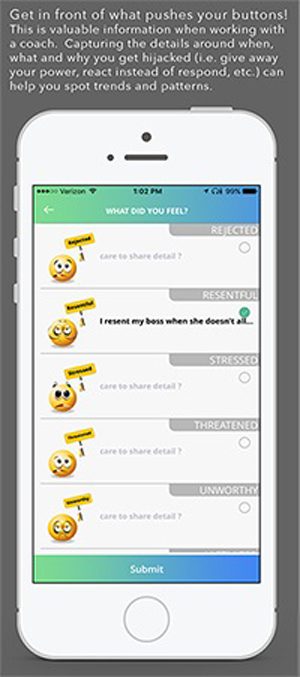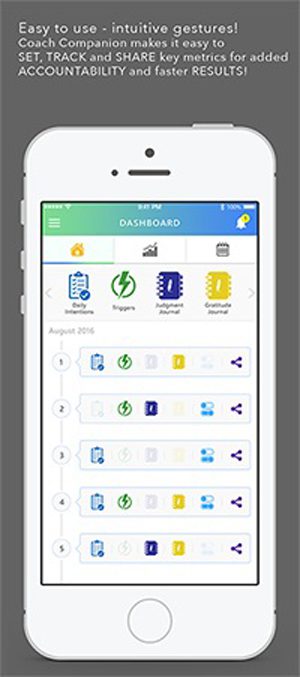
 Erika Alessandrini was working out on her treadmill when a great idea came to her – a career-coaching app she could use to help her clients.
Erika Alessandrini was working out on her treadmill when a great idea came to her – a career-coaching app she could use to help her clients.
Alessandrini looked at her smartphone, and she was surprised to find there wasn’t an app that met her needs. So, like all resourceful entrepreneurs, she businesswoman decided to create one. The result is Coach Companion, a tool for anyone who has goals and wants some help meeting them.
As a certified professional coach, Alessandrini wanted something that was easy to use, quickly accessible and could act as a partner for her, her clients and anyone else interested in improving their lives, personal and professional. A smartphone app seemed like the best fit for her mission.
 “There is benefit to any user who finds value in self-improvement,” Alessandrini said. “It is often said that if you aim at nothing, you’re bound to hit it. When we care enough about something to measure our progress, there is a much higher likelihood that we will achieve our goals.”
“There is benefit to any user who finds value in self-improvement,” Alessandrini said. “It is often said that if you aim at nothing, you’re bound to hit it. When we care enough about something to measure our progress, there is a much higher likelihood that we will achieve our goals.”
Unlike other apps that focus on one type of goal, Alessandrini said this is the first single platform where people can easily remain accountable for multiple personal and professional goals at once. The app uses emoji-based performance ratings and short text entries to measure and track a user’s day-to-day progress. The user can also share their progress with a coach or designated “accountability partner” for added motivation to stay on-track.
Alessandrini, creator of Coach Companion and CEO of Strategies for Success, a coaching and consulting firm is based in Carleton, a village in Monroe County, Mich., so having an app to keep in touch with her clients near and far also was an inspiration for Coach Companion.
 Here’s how it works: A user can remain accountable for multiple personal and professional goals at once with help from the app’s daily reminders and performance updates at a glance. Using text entries and emoji-based satisfaction ratings, users can monitor their progress toward their goals based on the following four key behavioral change metrics:
Here’s how it works: A user can remain accountable for multiple personal and professional goals at once with help from the app’s daily reminders and performance updates at a glance. Using text entries and emoji-based satisfaction ratings, users can monitor their progress toward their goals based on the following four key behavioral change metrics:
• Daily Intentions: Intentions are the user-chosen actions and behaviors that are essential for a user to achieve a desired goal. Users may set their own intentions or choose from a library of options.
• Triggers: Triggers are the details of situations that “push our buttons.” When a user feels triggered, they are likely to react emotionally rather than respond accordingly. Recording these details can help a user spot trends in when they lose control of their energy and power.
• Gratitude Journal: The gratitude journal encourages a user to write down the things they are grateful for, therefore helping a user to be mindful of the good things in life. Research suggests that this action can have therapeutic benefits
.• Judgment Journal: The judgment journal records the activity surrounding a user when they find themselves judging self or others. By understanding when and who they judge, a user can raise their consciousness and understand how they “show up” in a situation.
Coach Companion’s optional sharing feature, which is available in the paid version only, allows users to share their progress with their accountability partners, such as coaches, family members or friends. The app will help coaches and coachees achieve meaningful results faster by providing insight into the coachee’s recent actions and habits before a session occurs.
She also believes Coach Companion is an excellent alternative for those who do not hire a coach, but still want to benefit from having an accountability partner during their behavioral change process.
A free version of Coach Companion is available for download in the U.S. in the Apple App Store for users running iOS 10. A paid version can be purchased for $4.99 to eliminate ads and give users full use of the app’s sharing feature.






